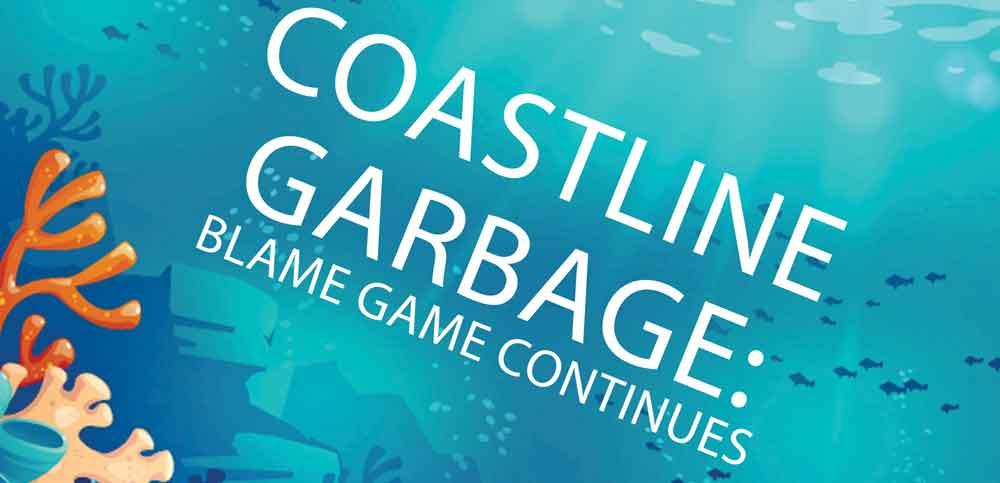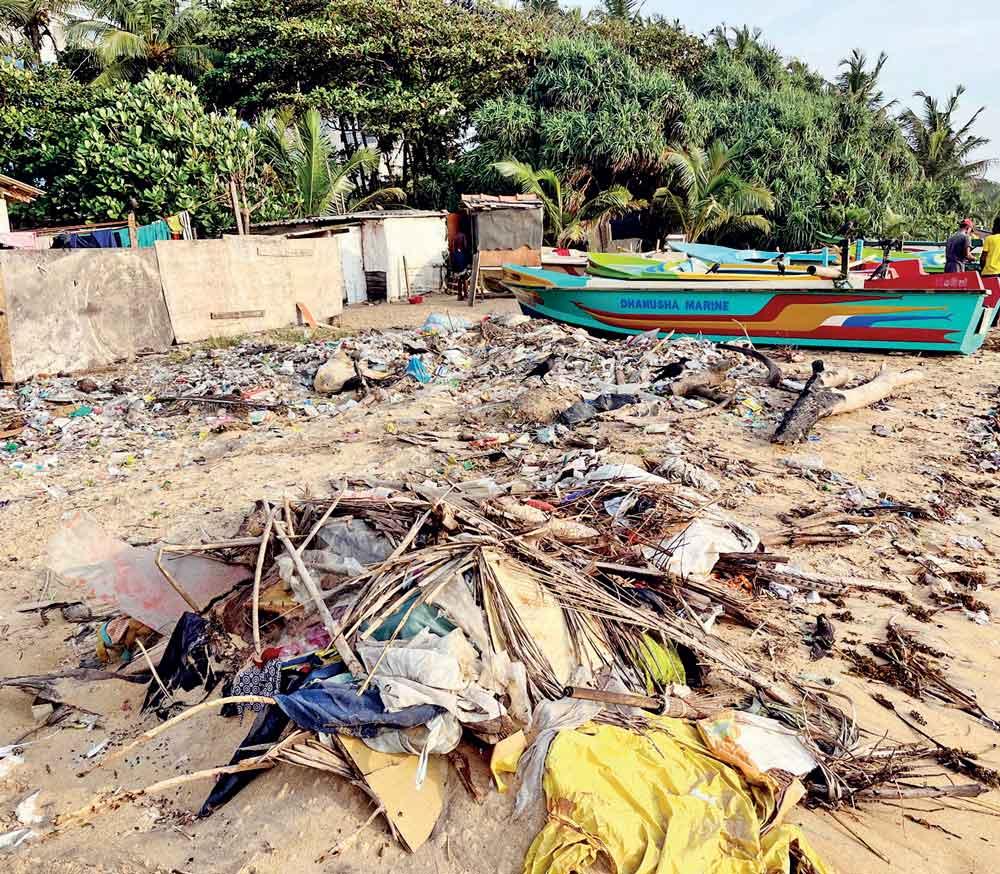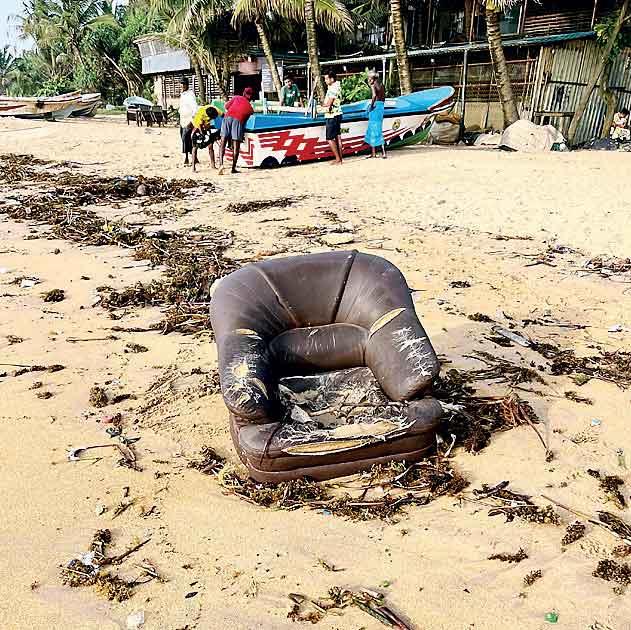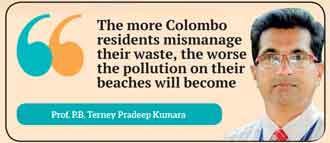06 Dec 2024 - {{hitsCtrl.values.hits}}


Garbage disposed of along Dehiwala beach
Pix by Safrah Fazal

A leather chair discarded on the beach, photographed on December 2
| Pollution not only an eyesore but also a dire threat to Sri Lanka’s fragile ecosystem and the health of citizens |
| The economic consequences of marine pollution will be grave, especially for those working in sectors like fishery and tourism |
 Those strolling along the Dehiwala beach heading towards Mount Lavinia will be greeted sensorially by one of Colombo’s unfortunate garbage disposal sites. To pinpoint the exact location: It lies just beyond the area where the canal meets the beach, with fishing boats scattered along the shoreline and wooden houses, primarily belonging to fisher-folk, lining the coast.
Those strolling along the Dehiwala beach heading towards Mount Lavinia will be greeted sensorially by one of Colombo’s unfortunate garbage disposal sites. To pinpoint the exact location: It lies just beyond the area where the canal meets the beach, with fishing boats scattered along the shoreline and wooden houses, primarily belonging to fisher-folk, lining the coast.
It was Patrick Hengst, a Dutch national residing in Sri Lanka, who informed this journalist of the dump site on November 30. Although well-aware of the notorious pollution affecting parts of the Dehiwala beach, this journalist decided to inspect the site personally on December 2 (Monday). Beyond the usual polythene bags, wrappers and plastic bottles and containers commonly found littering the beach, this journalist also encountered broken squatting pans, a commode, and a leather chair strewn along the shore.
A Sudda’s plea
|
Broken squatting pans and a commode found along Dehiwala beach on December 2
|
Hengst, deeply moved by the sight of the garbage along the coastline, shared his thoughts: “As a foreigner living in Sri Lanka, I have always been in awe of this country’s incredible natural beauty. However, these days, as I walk along the coast, my heart sinks at the sight of plastic and waste scattered across the shoreline, much of it likely discarded into nature without consideration.”
He emphasised that the pollution was not only an eyesore but also a dire threat to Sri Lanka’s fragile ecosystem and the health of its citizens.
“The long-term damage to marine ecosystems and wildlife is immeasurable. With the worsening climate crisis, our global environment can no longer bear such negligence. The economic consequences too will be grave, especially for those working in sectors like fishery and tourism.
“I am deeply concerned that many Sri Lankans seem blind to the pollution that threatens their land—pollution they themselves have created, which will eventually end up on their dinner plates. Tourists come to Sri Lanka for its unspoiled beauty. If this degradation continues, they will seek other destinations,” he warned.
The perspective of area residents
When this journalist spoke to the fisher-folk and residents along the beach, conflicting views emerged.
 Vivaan claimed the garbage was the result of individuals arriving stealthily at night to throw bags of trash into the sea, which later washed ashore. In contrast, Sunil, a local fisherman, attributed the pollution to the area’s residents. “The Municipal Council doesn’t collect garbage from the houses along the coast; they only collect it from the flats in the surrounding area. So, people living along the coast have no choice but to dump it wherever they can. Garbage is even buried on the beach,” he said.
Vivaan claimed the garbage was the result of individuals arriving stealthily at night to throw bags of trash into the sea, which later washed ashore. In contrast, Sunil, a local fisherman, attributed the pollution to the area’s residents. “The Municipal Council doesn’t collect garbage from the houses along the coast; they only collect it from the flats in the surrounding area. So, people living along the coast have no choice but to dump it wherever they can. Garbage is even buried on the beach,” he said.
Lalitha, however, offered a different perspective, stating that residents were sternly warned by the police against throwing garbage into the sea. “We were also asked to watch out for people arriving at night to dispose of trash. But nobody does that now,” she said.
Meanwhile, another resident who was collecting plastic containers along the shore, held that garbage originated from the canals following the recent rains and floods. She insisted that the coastal residents did not dump waste into the sea, as the Municipal Council collected garbage three times a week.
‘Colombo residents responsible’
“I have far worse pictures of the garbage along the Dehiwala shoreline,” said Prof. P.B. Terney Pradeep Kumara, Professor of Oceanography at the University of Ruhuna, when this journalist shared photographs taken on December 2.
“The residents of Colombo are responsible for the pollution on their beaches,” Prof. Kumara asserted. He explained that garbage accumulates along the shore through multiple pathways: Waste dumped into Colombo’s waterways, mismanaged garbage entering canals, debris carried by the Kelani River after the recent rains and flooding, and even trash discarded by residents who miss their garbage collection truck and have no other disposal options.
“The more Colombo residents mismanage their waste, the worse the pollution on their beaches will become. Responsibility lies not just with the people but also with the Municipal Council, the Marine Environment Protection Authority (MEPA), the Waste Management Authority of the Western Province, the Central Environmental Authority (CEA), and the Ministry of Environment,” Prof. Kumara emphasised.
Speaking about the Marine Pollution Prevention Act (No. 35 of 2008), Prof. Kumara highlighted that the Act primarily focuses on pollution from ships, with little attention given to coastal pollution. “This Act has been under amendment for the last six to seven years, which sets a poor precedent. Whether the Act is repealed and replaced or simply amended depends on the government and relevant authorities. However, they mustn’t take so long to act. By the time an amended Act is finalised, several new issues will likely have emerged,” he warned.
Prof. Kumara noted that while completely resolving the issue of garbage may be unrealistic, authorities must adopt innovative measures to prevent people from discarding waste into waterways, roadsides, or coastlines. “For instance, anyone caught dumping garbage in unauthorised areas should be made to engage in community service, such as picking up garbage. While many would willingly pay fines, they would find cleaning up trash far less appealing,” he suggested.
What do the authorities have to say?
The garbage dumped along the Dehiwala coastline results from a combination of factors, including actions by local residents, waste thrown by individuals from other areas, trash carried through the canal, and debris from flooding caused by recent rains, an official from the MEPA explained on condition of anonymity.
“We received numerous complaints. Just two weeks ago, even on a weekend, a team from MEPA, the Police, and some area residents organised a cleanup. Due to the recent flooding, a significant amount of waste was washed onto the beach from the canal,” the official said.
The official noted that the persistent accumulation of garbage in the area has become a pressing issue, as people have normalised using it as a dumping site. “We conduct numerous community awareness programmes related to this. We also have beach caretakers who perform daily cleanups, but the problem is we can’t change people’s habits,” the official remarked.
With the current Marine Pollution Prevention Act (No. 35 of 2008), it is challenging to impose fines on polluters. The official underscored that MEPA is in the final stages of introducing amendments to the Act, which will empower them to take action against polluters. “These amendments will enable us to address such issues more effectively,” the official added.
The official highlighted that the primary source of pollution is from the land, not the sea. Despite this, agencies such as the CEA, the Waste Management Authority of the Western Province, and the Dehiwala-Mount Lavinia Municipal Council have not taken responsibility for managing the garbage accumulating on the beaches. “We have held several discussions with the Municipal Council, but to no avail. They have the manpower and resources, while we do not. Yet, we end up organising cleanups, assembling people from various organisations. This issue has been addressed in the proposed amendments to our Act as well,” the official explained further.
Attempts to contact A.J.M. Gunasekara, MEPA General Manager (Acting), for comments were unsuccessful.
When contacted by the Daily Mirror, a Public Health Inspector from the Dehiwala-Mount Lavinia Municipal Council stated that the Municipal Council regularly collects garbage along the Dehiwala beach area. The official emphasised that they also organise beach cleanup programmes but admitted it is a challenging task. “An hour or so after the area is cleaned, garbage accumulates again due to waste from the canal washing into the sea,” the official noted. He added that beach cleanups are typically organised on Saturdays.
While the blame game remains common within government sectors, it is evident that the issue of garbage on Sri Lanka’s coastlines is not being adequately addressed. Protecting the nation’s beaches and marine ecosystems is imperative — not only for the environment but also for preserving Sri Lanka’s natural beauty and the livelihoods that depend on it.
25 Dec 2024 26 minute ago
24 Dec 2024 24 Dec 2024
24 Dec 2024 24 Dec 2024
24 Dec 2024 24 Dec 2024
24 Dec 2024 24 Dec 2024